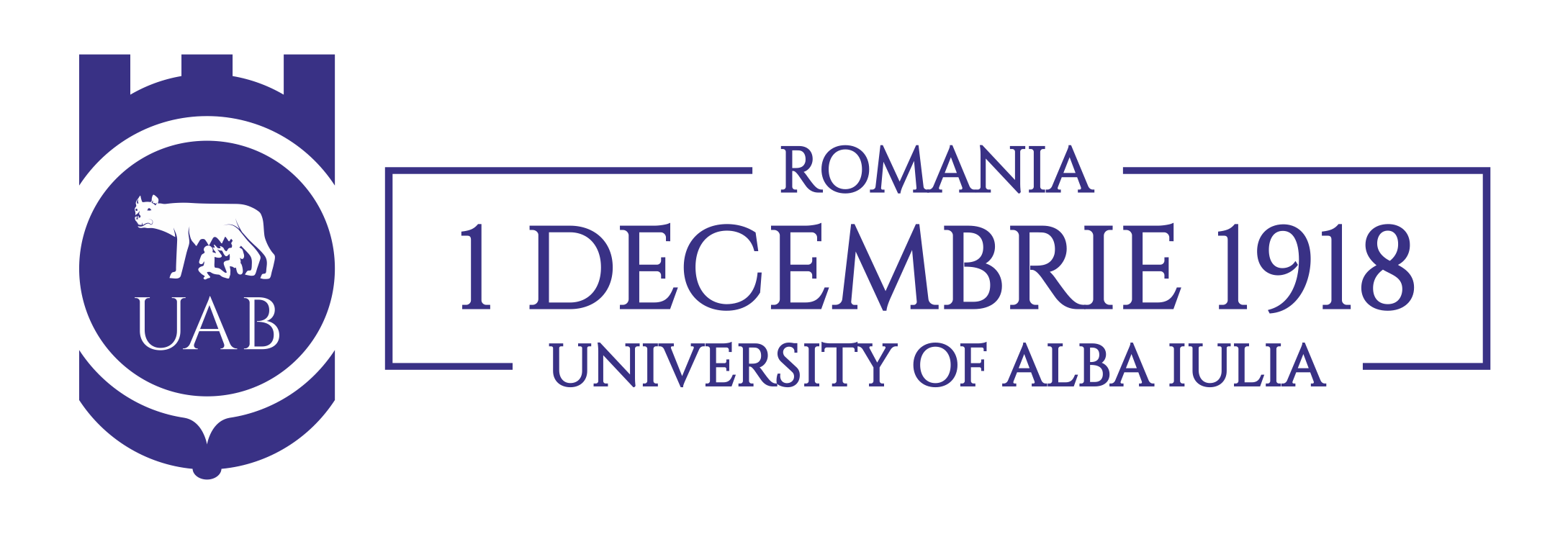
Accredited Program, duration of studies 3 years / 180 credits
The study of history falls into the fundamental field of humanities. Knowledge, understanding of the basic concepts, theories and methods of the field of History and of the area of specialization will be accessible to those who will opt for this specialization under license.
Within the Faculty of History and Philology, scientific research in the field of history is carried out by teams that bring together the teaching staff of the departments of the Faculty, masters and doctoral students, such as: "Iuliu Paul" Institute of Systemic Archeology (accredited research structure) and "Iuliu Maniu" Center of Excellence for Historical and Political Research (accredited research structure). In undergraduate studies, full-time courses, lasting 3 years (6 semesters), in addition to the specialized disciplines, our students attend module 1 of psycho-pedagogical training, so that, at the end of their studies, in addition to the Bachelor's Degree they also receive a Certificate of Entry into the teaching profession, thus securing a job in the pre-university education system.
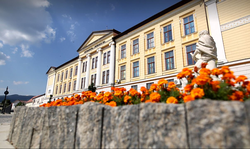
Accredited Program, duration of studies 3 years / 180 credits
Authorized to operate provisionally by Romanian Government Decision no. 294, of 16.06.1997, accredited by the Decision of the Romanian Government no. 676, of 28.06.2007 and evaluated institutionally in March 2015, the bachelor's degree program Romanian language and literature - English language and literature currently operates in accordance with the Decision of the Romanian Government no. 580, of 09.07.2014, regarding the approval of the Nomenclature of the fields, of the structures of the higher education institutions and of Bachelor study specializations / programs accredited or authorized to function.
During the BACHELOR studies, full-time courses, lasting 3 years (6 semesters), in addition to the specialized disciplines, our students attend module 1 of psycho-pedagogical training, so that, at the end of their studies, in addition to the Bachelor's Degree they also receive a Certificate of Entry into the teaching profession, thus securing a job in the pre-university education system.
The mission of the study program ROMANIAN LANGUAGE AND LITERATURE - ENGLISH LANGUAGE AND LITERATURE is to train specialists in the field of philology whose professional skills, attitudes and values meet the requirements of the current socio-economic and cultural environment. In order to fulfill this mission, the program applies through the disciplines it proposes, aspects of theoretical research in the area of language / communication studies and cultural studies to current issues and realities.
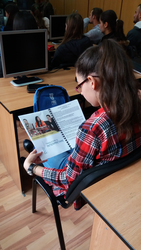
Accredited Program, duration of studies 3 years / 180 credits
The program started out of a desire to address the field of modern applied languages. Thus, the Faculty of History and Philology offers the opportunity to assert itself in the field of philology of those students who are passionate about foreign languages and who do not necessarily want to pursue a teaching career. The program has an applicative character and offers many practical courses in English and French. Upon graduation, students have language and communication skills (level B2 / C1) for English and French, according to the language reference levels specified in the Common European Framework. Furthermore, students have the opportunity to study German as an optional subject (for a period of three years) and to acquire language skills (level A2 / B1) for this language.
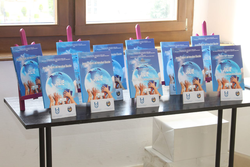
The new study program TRANSLATION AND INTERPRETATION (GERMAN-ENGLISH) is organized in response to the demands of the labor market and its mission is to train specialists in the field of Modern Applied Languages (translators with higher education, interpreters and translators), whose professional skills, attitudes and values to meet the requirements of the current socio-economic and cultural environment. The training of specialists in communication and intercultural relations is considered, thus responding to the need for qualified staff both in international companies in the area and in public institutions in the process of globalization. By default, the program aims at several professional objectives specific to the field: effective communication, in at least two modern languages, in a wide framework of professional and cultural contexts, by using registers and specific linguistic variants in speech and writing (Level of competence B2- C1 in both languages - according to the European Framework of Reference); adequate application of written and oral translation and mediation techniques, in areas of wide and semi-specialized interest; adequate application of ICT (computer programs, electronic dictionaries, databases, document archiving techniques, etc.) for documentation, identification and storage of information, word processing and proofreading; linguistic and cultural negotiation and mediation, professional and institutional communication, analysis and evaluation of effective communication.
The organization of the new study program Translation and Interpretation (German-English) is part of the overall strategy of the University, aiming to strengthen the curricula of the current structure, in parallel with their continuous adaptation to the needs of employers, interdisciplinary and connected to current demand and predictable changes in the labor market.
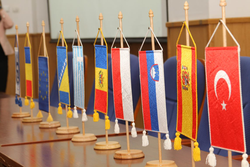
Aims and scope
The one-year, full-time academic programme in Romanian as a Foreign Language is addressed to foreign citizens who wish to gain entry onto a Romanian degree programme (at bachelor, master, Ph.D. level), as well as post-graduate and advanced training programmes in various fields. The programme also meets the needs of expatriates who work in Romania and who want to acquire a formal language certification.
The course aims at developing international students" skills in reading, writing, listening and speaking in Romanian for academic purposes. By the end of the course, students will have reached level B2 of the Common European Framework.
Besides the 22 contact hours per week, the programme also includes extracurricular activities to ensure that international students understand Romanian academic life and culture. Various social events, excursions, outings and documentary visits to other cities and tourist attractions are organised regularly to ensure social, linguistic and cultural integration.
Teaching and assessment
This course is taught by a team of experienced scholars and uses varied teaching methods, including lectures, seminars, workshops, and one-to-one tutorials. Students normally have twenty hours of scheduled contact time per week. In addition, staff are available each week for one-to-one tutorials.
Assessment consists of a combination of methods, ranging from assessed coursework, including essays, assignments, creative writing and other tasks; progress tests; oral examinations, including viva voce, individual and group presentations and seminars; individual research assignments, including library projects.
Certification
Students who successfully complete the course and pass the final examination will be awarded a CERTIFICATE OF PROFICIENCY IN ROMANIAN LANGUAGE - B2 LEVEL. The programme is approved by the Romanian Ministry of Education and Scientific Research; therefore certificates are valid across the European Union.

Accredited Program, duration of studies- 3 years / 180 credits
Qualifications:
1. Primary school teacher
2.Teacher in Preschool education
Professional skills:
- Designing training or educational programs for primary and preschool education;
- Carrying out the activities specific to the instructive-educational process in primary and preschool education;
- Evaluating the learning processes, the results and the progress registered by the preschoolers / young school children;
- The managerial approach of the group of preschoolers / young schoolchildren, of the educational process and of the learning / social integration activities specific to the age of the target group;
- Counseling, guidance and psycho-pedagogical assistance of various categories of people / educational groups (preschoolers / small schoolchildren / students, families, teachers, employees, etc.);
- Continuous self-assessment and improvement of professional practices and career development;
- Use of methods of scientific research and data processing in the field of education;
- Applying the characteristics of student-centered education in the design, implementation and evaluation of the school curriculum;
Transversal skills:
- Application of principles and rules based on explicit value options;
- Effective cooperation in professional, interdisciplinary work teams, specific to the development of projects and programs in the field of education sciences;
- Use of effective lifelong learning methods and techniques for continuous training and professional development;
- Promoting the values associated with the achievement of quality education, in accordance with the internal educational policies and in accordance with those developed and popularized at European level, based on the knowledge of the specificity of the European educational field and of interculturality.

Accredited Program, duration of studies- 3 years / 180 credits
Qualifications:
1. Primary school teacher
2.Teacher in Preschool education
Professional skills:
- Designing training or educational programs for primary and preschool education;
- Carrying out the activities specific to the instructive-educational process in primary and preschool education;
- Evaluating the learning processes, the results and the progress registered by the preschoolers / young school children;
- The managerial approach of the group of preschoolers / young schoolchildren, of the educational process and of the learning / social integration activities specific to the age of the target group;
- Counseling, guidance and psycho-pedagogical assistance of various categories of people / educational groups (preschoolers / small schoolchildren / students, families, teachers, employees, etc.);
- Continuous self-assessment and improvement of professional practices and career development;
- Use of methods of scientific research and data processing in the field of education;
- Applying the characteristics of student-centered education in the design, implementation and evaluation of the school curriculum;
Transversal skills:
- Application of principles and rules based on explicit value options;
- Effective cooperation in professional, interdisciplinary work teams, specific to the development of projects and programs in the field of education sciences;
- Use of effective lifelong learning methods and techniques for continuous training and professional development;
- Promoting the values associated with the achievement of quality education, in accordance with the internal educational policies and in accordance with those developed and popularized at European level, based on the knowledge of the specificity of the European educational field and of interculturality.
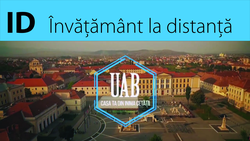
Accredited Program, duration of studies- 3 years / 180 credits
Qualifications:
1. Primary school teacher
2.Teacher in Preschool education
Professional skills:
- Designing training or educational programs for primary and preschool education;
- Carrying out the activities specific to the instructive-educational process in primary and preschool education;
- Evaluating the learning processes, the results and the progress registered by the preschoolers / young school children;
- The managerial approach of the group of preschoolers / young schoolchildren, of the educational process and of the learning / social integration activities specific to the age of the target group;
- Counseling, guidance and psycho-pedagogical assistance of various categories of people / educational groups (preschoolers / small schoolchildren / students, families, teachers, employees, etc.);
- Continuous self-assessment and improvement of professional practices and career development;
- Use of methods of scientific research and data processing in the field of education;
- Applying the characteristics of student-centered education in the design, implementation and evaluation of the school curriculum;
Transversal skills:
- Application of principles and rules based on explicit value options;
- Effective cooperation in professional, interdisciplinary work teams, specific to the development of projects and programs in the field of education sciences;
- Use of effective lifelong learning methods and techniques for continuous training and professional development;
- Promoting the values associated with the achievement of quality education, in accordance with the internal educational policies and in accordance with those developed and popularized at European level, based on the knowledge of the specificity of the European educational field and of interculturality.
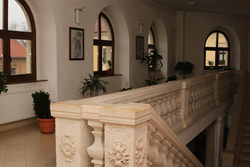
Duration of studies
3 years
Brief presentation
The Bachelor's degree program in Archaeology at the "1 Decembrie 1918" University of Alba Iulia is offered by the Faculty of History, Letters and Sciences of Education. This program lasts 3 years (6 semesters) and is conducted in a full-time mode. Its mission is to train specialists in the field of archaeology, capable of carrying out research and conservation activities of the archaeological heritage.
Qualifications and professions upon graduation
Graduates of the program obtain a Bachelor's degree in Archaeology, which allows them access to various professions according to the Romanian Classification of Occupations (COR), such as: Archaeologist (COR 263206); Historian (COR 263302); Local Promoter (COR 263220).
Main subjects studied
Introduction to universal ancient history; Introduction to the ancient history of Romania; Prehistory; Introduction to archaeology; Practical course in archaeology (I and II); Social and funerary archaeology; Roman provincial archaeology; Archaeology of the Migration Period and the Middle Ages; Paleobotany; Archaeology of raw material sources in pre- and protohistory; Archaeology of architecture; Archaeology of food; Modern methods and techniques of digital documentation in archaeology; Archaeological topography; Specialized practice.
Aspects regarding professional practice
The program places a strong emphasis on practical training for students. They participate in specialized internships at archaeological sites, collaborating with institutions such as museums and research institutes. Students also have access to laboratories equipped with modern equipment for the analysis of artifacts.
Possibilities for further studies (master's degree, doctorate)
After completing their bachelor's degree, graduates can opt for master's programs in related fields, such as: Research, conservation and valorization of historical heritage; Interdisciplinary archaeological research; Archaeology and classical studies. The "1 Decembrie 1918" University of Alba Iulia offers master's programs in the field of archaeology, thus allowing the continuation of studies at the same institution.
Employment opportunities
Graduates of the Archaeology program have employment opportunities in various institutions and organizations, such as: Public or private museums and collections; Archaeological research institutions; Heritage protection and conservation organizations; Local and central public administrations, in culture and heritage departments; Private companies involved in construction and development projects, which require archaeological impact studies. Also, the skills acquired allow graduates to participate in international research projects or to pursue academic careers by continuing their studies at the doctoral level.
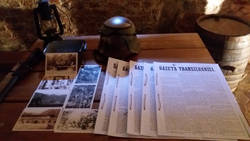
Duration of studies
4 semesters
Brief presentation of the program
The study program is a research master's degree aimed at undergraduate graduates who want to deepen their studies in the field of History. It is desired to ensure an efficient and pragmatic training of master students, which will allow their further integration from a professional point of view, emphasizing the assimilation of elements of scientific research, both through general objectives (in-depth knowledge of some areas of history; ability of interpersonal communication and high-level public speaking; effective and correct written and oral expression, etc.) as well as through specific objectives (ability to critically interpret historiographical sources and writings; ability to construct a coherent historiographical discourse through correct use of sources, framing events in the historical context and proposing new interpretations, open to dialogue with other socio-human sciences, which would bring a progress of knowledge; mastering the rules of research methodology and ethics, etc.).
Qualifications and professions at graduation (according to the Romanian Classification of Occupations)
Historian (COR 263302), political scientist (COR 263304); historiographer (COR 263303).
The main disciplines studied
Regional identities in the Middle Ages; Regional identity - national identity in Enlightenment Transylvania; Romanian-Cyrillic paleography; Religious diversity and social modernization in early modern Europe; Transylvania and the art of Central Europe; Federalist Reform Projects in the Austro-Hungarian Empire; Nationalism in Central and Eastern Europe (20th century); Ethnic minorities in Transylvania; Non-religious identities.
Aspects regarding professional practice
The internship has an important role, helping the students accumulating knowledge regarding the theoretical dimensions of the field. Thus, in the Curriculum, the internship is one of its main constituents. This can be done both in Romania (Alba County Directorate for Culture and National Heritage, National Union Museum in Alba Iulia; SC Gigapixel Art SRL Cugir), and abroad, at partner universities in Germany, Poland, Malta, Italy, through Erasmus + programs.
Possibilities for further studies (master's degree, doctorate)
Graduates can continue their studies at the Doctoral School of History, within UAB, where they can choose a research topic in the following directions: Modern History, Contemporary History, History of Culture and Historical Anthropology.
Employment opportunities in the labor market
Graduates can work in museum, archives, research institutions (museums, archives, research institutes, etc.), but also in the field of high school education (provided the graduation of the psycho-pedagogical module), as well as in agencies and communication departments.
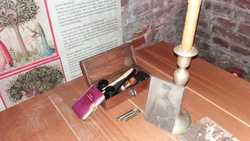
Duration of studies
4 semesters
Brief presentation of the program
The study program is a professional master's degree, which aims to transmit knowledge and train practical skills in order to capitalize on the historical heritage in correlation with the needs of the labor market. Among the main objectives are the elaboration of professional and / or research projects, using innovatively a wide range of quantitative and qualitative methods; mastery of the specialized language and the ability to communicate to the audience of specialists and non-specialists the results of the projects; knowledge, down to the last detail, of the problems faced by the historical heritage and the capacity to apply in a practical way the knowledge acquired through study for vocational training.
Qualifications and professions at graduation (according to the Romanian Classification of Occupations)
Curator of works of art and historical monuments (higher education) (COR 262102), museographer (COR 262103), restorer of cultural assets (higher education) (COR 262107)
The main disciplines studied
Basics of heritage conservation; Conservation and restoration of wooden structural and decorative components of monuments; Evidence and legislation of cultural heritage; Research and documentation of historical monuments; Architecture and urbanism in Transylvania; Conservation and restoration of the structural and decorative stone components of the monuments; Fortification systems in the Middle Ages and the modern era; Pathology of physical and chemical degradation of cultural goods.
Aspects regarding professional practice
The specialized practice plays an important role in the study program offered to master students. Thus, the practical training component has a large share, being one of the main constituents. To this end, the practical activities aim at the use of specialized knowledge, as well as the execution of complex professional tasks, in conditions of professional autonomy and independence. The practice can be performed at the university, both in the Restoration-Conservation Laboratory and on the archeological sites organized by the university staff. Also, partnerships were concluded with various institutions, such as the Alba County Directorate for Culture and National Heritage, the Cluj-Napoca Institute of Archeology and Art History, the Museum of Archeology, History and Ethnography in Hunedoara. In addition, through Erasmus + programs, internships can be done abroad, at universities with which our institution has concluded partnership agreements.
Possibilities for further studies (master's degree, doctorate)
After graduation, candidates can continue their research at UAB Doctoral School of History, and they can choose a research topic in Prehistory, Archeology, Archaeometry and Historical Anthropology.
Employment opportunities in the labor market
Graduates can be employed as museographers, restorers of cultural assets, restorers of historical monuments in private companies, as well as history teachers in high school.
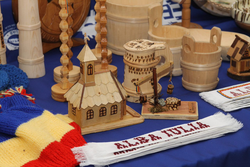
Duration of studies
4 semesters
Brief presentation of the program
The master's program ROMANIAN LITERATURE AND CULTURE WITHIN A EUROPEAN CONTEXT offers graduates the following professional skills: 1. Efficient communication, written and oral; 2. The complex description of the domain of Romanian literature; adequate use of the conceptual apparatus of the humanities for the interdisciplinary investigation of complex cultural facts; 3. The complex interpretation, diachronic and synchronic, of the study methods regarding the Romanian literature; adequate use of the methodological apparatus of the humanities for the interdisciplinary investigation of complex cultural facts; 4. The complex definition of the Romanian literary and cultural phenomenon in the historical, social, philosophical context of the epoch; 5. Conception and presentation of study models of Romanian literature and culture; 6. Compilation and development of advanced research projects and programs. They are associated with transversal competences: 1. Collecting, managing and directing information specific to solving complex tasks within a context (designing, receiving, transmitting, processing, storing information in profile documents), in the conditions of advanced knowledge of Romanian literature in diachrony and synchrony; 2. Coordination of efficient work techniques in a multidisciplinary team, corresponding to the various hierarchical levels; 3. Objective self-assessment of the need for continuous professional training and rational choice of the means of this training, in order to insert and adapt to the requirements of the labor market.
The mission of the study program is represented by the acquisition of multiple knowledge and skills, targeted by the very objectives of the program: in-depth knowledge of the area of specialization and, within it, of theoretical, methodological and practical developments specific to the program; appropriate language in communicating with different professional backgrounds; the use of specialized knowledge for explaining and interpreting new situations, in broader contexts associated with the field; the integrated use of the conceptual and methodological apparatus, in conditions of incomplete information, in order to solve new theoretical and practical problems; nuanced and relevant use of evaluation criteria and methods to formulate value judgments and substantiate constructive decisions; integrated interpretation in various contexts, national and European, of Romanian literature, with the explanation in a multidisciplinary context of complex cultural phenomena; formulating and motivating, within some professional projects, a personal point of view in relation to literary and cultural phenomena and texts; elaboration of a research project on the work of a writer / a literary epoch / a literary school / a group of thematically or ideologically related texts, using appropriately the concepts and methods of the science of literature and comparativism; performing complex professional tasks, in conditions of autonomy and professional independence; self-control of the learning process, diagnosis of training needs, reflective analysis of one's professional activity.
Qualifications and professions upon graduation (according to the Classification of Occupations in Romania)
Literary Researcher - 264304; Diplomatic Relations Interpreter - 264303; Research Assistant in Philology - 264315 ESCO Qualification Code (European Skills / Competences, Qualifications and Occupations) https://ec.europa.eu/esco/portal/occupation - ISCO-08 code 264 - http: //data.europa .eu / esco / isco / C2641 Authors and related writers; http://data.europa.eu/esco/isco/C2643 Translators, interpreters and other linguists / Access to the doctoral cycle (Philology).
The main disciplines studied
Among the disciplines studied are: Comparative literature. 20th Century Prose, Literary Criticism. Critical text - principles, methods, Cultural identity and literary discourse, Romanian cultural and literary currents and orientations in the European context, Romanian interwar cultural attitudes in the European context, Communication models. Argumentative and rhetorical techniques and strategies, Imaginary theory, Romanian exile literature, Romanian traditional culture from the perspective of globalization, 20th century poetry. Literary theory and comparativism, European myths in literary processing and essay interpretations, etc. The studies are carried out over a period of 2 years (4 semesters, 14 weeks / semester), full-time education, with the accumulation of a number of 120 credits. Completion consists of a dissertation and allows access to the doctoral cycle in Philology.
Aspects regarding professional practice
Master's students acquire multiple knowledge and skills, targeted by the very objectives of the program: in-depth knowledge of the area of specialization and, within it, of the theoretical, methodological and practical developments specific to the program; appropriate use of specific language in communication with different professional backgrounds; the use of specialized knowledge for explaining and interpreting new situations, in broader contexts associated with the field; the integrated use of the conceptual and methodological apparatus, in conditions of incomplete information, in order to solve new theoretical and practical problems; nuanced and relevant use of evaluation criteria and methods to formulate value judgments and substantiate constructive decisions; integrated interpretation in various contexts, national and European, of Romanian literature, with the explanation in a multidisciplinary context of complex cultural phenomena; formulating and motivating, within some professional projects, a personal point of view in relation to literary and cultural phenomena and texts; elaboration of a research project on the work of a writer / a literary epoch / a literary school / a group of thematically or ideologically related texts, using appropriately the concepts and methods of the science of literature and comparativism; performing complex professional tasks, in conditions of autonomy and professional independence; self-control of the learning process, diagnosis of training needs, reflective analysis of one's professional activity.
Possibilities for further studies (master's degree, doctorate)
The university organizes the final exams for master's degree studies (dissertation) and issues the corresponding master's degrees for the specializations approved by the Ministry of Education and for the specializations accredited by ARACIS, according to the law. Master's graduates of this program are informed that the University organizes the Doctoral School in Philology and issues doctoral degrees in the fields of specialization for which it has the quality of I.O.S.U.D. The doctoral diploma is issued subject to validation by the National Council for Attestation of University Degrees, Diplomas and Certificates, by order of the Minister of Education.
Employment opportunities in the labor market
The fundamental mission of the program is to provide graduates with a complex package of knowledge, skills and abilities, as well as vocational support that will allow them to be quickly absorbed into the labor market, as specialists: teacher in middle school and high school (conditioned by the psycho- pedagogical), documentary filmmaker, translator, interpreter, educational advisor, literary researcher in newsrooms, publishing houses and libraries, book distribution reviewer, cultural advisor, advisor to public institutions, press correspondent, etc.
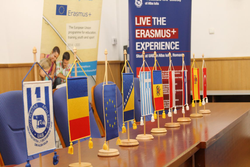
The mission of the Master"s programme is to train specialists in the field of Philology whose professional skills, attitudes and values meet the requirements of the current socio-economic and cultural environment.
In order to carry out this mission, the Master"s programme applies, through the disciplines it proposes, theoretical research in the area of cultural studies, adapted to current problems and realities, as well as aspects of theoretical research and professional activities in the area of language/communication and literature studies.
In particular, we highlight the fact that the master"s degree programmes in the field of Philology have formulated their objectives based on the needs identified following the careful analysis of the socio-academic context: the need to promote Romanian language, literature and culture more strongly at regional, national and European level; the need to deepen the study of English language, literature and culture; the need to ensure the possibility of continuing bachelor"s studies through a master"s programme as an indispensable step towards doctoral studies.
The Master"s programme Language, Literature and English Culture in the European Context offer graduates the following professional competences:
1. Effective communication, written and oral, in English, at C2 Level.
2. Description of the phonetic, lexical, and grammatical system of the English language in its diachronic evolution and in its synchronous varieties.
3. Presentation of literary phenomena in the historical, social, philosophical context of their era and in terms of regional differences.
4.Appropriate use of the conceptual and methodological apparatus of the humanities for the interdisciplinary investigation of complex cultural facts. 5. Development and implementation of cultural projects and policies at various levels (local, regional, national, European, global).
The main disciplines studied: Cultural Identity and Literary Discourse; Intercultural Transfer; Migration of European Cultural Concepts. Central and Peripheral Identities; Intercultural Pragmatics; English in the Context of Globalization; Metaphoric Language in Contemporary Journalistic Speech; Conversational Analysis, Corpus Linguistics, Intercultural Communication in Business.
Length of studies
Studies are carried out over a period of 2 years (4 semesters, 14 weeks / semester), full time, 120 credits.
The Master students acquire multiple knowledge and skills, which are targeted by the very objectives of the programme:
-in-depth knowledge of the area of specialisation and, within it, of the theoretical, methodological and practical developments specific to the programme;
-the appropriate use of specific language in communication with different professional environments;
-the use of expert knowledge to explain and interpret new situations, in broader contexts associated with the field;
-the integrated use of the conceptual and methodological apparatus, under conditions of incomplete information, to solve new theoretical and practical problems.
Career prospects
The fundamental mission of the programme is to provide graduates with a complex package of knowledge, skills and competences, as well as vocational support to enable them to quickly be absorbed by the labour market, as specialists:
- Teacher in secondary education (conditioned by the psycho-pedagogical module),
- Documentarian,
- Translator,
- Interpreter,
- Education adviser,
- Literary reviewer in newsrooms, publishing houses and libraries,
- Book dissemination reviewer,
- Cultural adviser,
- Public institution adviser,
- Press correspondent, etc.
The programme also prepares specialists in communication and intercultural relations, thus responding to the need for qualified staff in both international companies and public institutions in the process of globalisation.
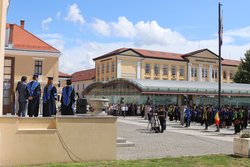
Accredited Program, duration of studies 4 semesters/120 credits
Qualifications:
- Education Advisor;
- Education Expert;
- School Inspector.
Specific Skills:
- In-depth knowledge of concepts, strategies, methods and techniques in the field of educational management; abilities to put into practice the functions of the manager and the educational management: foresight, organization, decision, restraint, coordination, control and evaluation; mastery of the specialized language and the ability to communicate to the audience of specialists and non-specialists the results of the projects, the motivation of the decisions, the conclusions of the evaluations, the directions of the future actions; capacities for design, evaluation and development of the educational process, elaboration of curricula and institutional development projects;
- Knowledge and skills to apply analysis and design techniques in strategic educational management (resource-needs analysis, SWOT analysis, context analysis, cost-quality analysis, etc.); knowledge and use of scientific research methodology in investigating and solving school problems and in developing action / development projects;
- Knowledge and abilities of economic-financial analysis, projection and control regarding the budget of the school institution; the ability to prevent, mediate and resolve situations of educational crisis; the ability to evaluate and improve the strategic performance of teams; knowledge, skills and attitudes necessary for counseling activities of students and families; computer skills, access to computer communications networks, use of computer systems and technologies applied in educational management;
Transversal skills:
- The ability to mobilize, combine and use general and professional knowledge and skills autonomously in accordance with the various requirements specific to a particular context, situation or problem;
- Assuming leadership roles and functions of professional groups, educational organizations and institutions or training / development departments of human resources in other institutions; the ability to operate with dynamic, creative and strategic strategies;
- Availability of analysis and interpretation of values that describe a situation, an event or a behavior; the ability to cope with change, complex and unforeseen situations;
- Moral integrity, character balance, critical attitude and persuasiveness in promoting the genuine positive values of the social community.
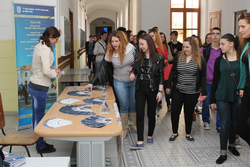
Accredited Program, duration of studies 4 semesters/120 credits
Qualifications:
- Researcher in pedagogy;
- Education expert;
- Specialist in education;
Specific Skills:
- Capacities for analysis and interpretation on the conceptual system and theoretical models that underlie the field of Early and Primary Teacher Education; skills related to curriculum implementation; management skills of reflection, argumentation regarding the functioning of the education system, and of the curricular reform in the field of Early and Primary Teacher Education; ability to adequately design interventions in the field of Early and Primary Teacher Education;
- Knowledge and skills of differentiated and individualized approach of the child and the student; ability to formulate assessment tasks appropriate to the age level and level of development of cognitive skills knowledge and use of scientific research methodology in investigating and solving school problems and in developing action / development projects; knowledge and skills of counseling, guidance and psycho-pedagogical assistance of various categories of people / educational groups; the ability to prevent, mediate and resolve situations of educational crisis; the ability to design, carry out and capitalize on research projects in the field of Early and Primary Teacher Education. The strategic performance of the teams; knowledge, skills and attitudes necessary for career and personal development management;
Transversal skills:
- The ability to achieve an adequate management of the relations with the educational partners; the ability to communicate in situations specific to Early and Primary Teacher Education, at different times and in different contexts;
- Cognitive abilities with flexible functioning, transferable and efficient availability of analysis and interpretation of values that describe a situation, an event or a behavior;
- The ability to capitalize on the attitude set needed for assessment and self-assessment as close as possible to objectivity, the ability to cope with change, complex and unforeseen situations;
- Moral integrity, character balance, critical attitude and persuasiveness in promoting the authentic positive values of the social community.
